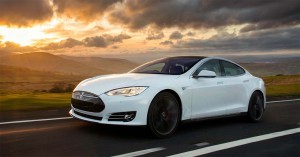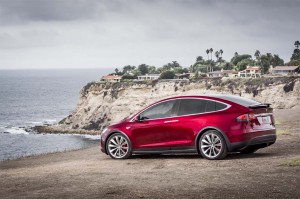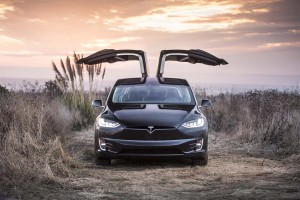
The new Tesla Model S 100D gets 315 miles on a single charge and will do 0 to 60 in just 2.5 seconds.
Tesla is determined to prove that everything you thought you knew about electric vehicles is wrong, the maker delivering Ferrari-like performance and more than 300 miles of range with a pair of new battery-cars.
The new Tesla Model S P100D will not only launch from 0 to 60 in about 2.5 seconds using the maker’s optional Ludicrous mode, but will also deliver up to 315 miles per charge. The Model X P100D will also deliver sub-3-second launches, but won’t quite crack 300 miles of range.
The two new models counter conventional wisdom that battery-electric vehicles are slow and can’t travel nearly as far as a conventional, gas-powered vehicle. While Tesla hasn’t released specific details, early versions of the two battery-cars could get up to an 80% charge in less than 30 minutes using the maker’s high-voltage Supercharge network.
Automakers, in general, have not only been launching a number of new battery-electric vehicles, or BEVs. And a number of these new models break the old paradigms of slow and stodgy. Some are also coming in at significantly lower price points.
General Motors, for example, will hit market before year-end with the Chevrolet Bolt, a people-mover that can deliver about 200 miles of range at a price of around $30,000 after federal tax credits. If anything, 200 miles per charge is becoming the generally accepted norm as makers aim at overcoming so-called range anxiety.
Performance numbers are also improving, the Bolt expected to hit 60 in around 8 seconds. New, longer-range models, such as the Audi SUV due by 2018, will manage to top 60 in under five seconds, the maker said, while the Porsche Mission E will make it in four seconds or less.
But with their optional new 100 kilowatt-hour batteries, the Models S and X P100D clearly raise the bar.
(Tesla producing more robust Autopilot. For more, Click Here.)
The electric sedan’s 0 to 60 time of 2.5 seconds lags only the LaFerrari and Porsche 918 Spyder – both limited-edition supercars running north of $800,000. At 2.9 seconds, the new SUV remains one of the fastest production vehicles ever made.
The 100 kWh battery pack is also the largest lithium-ion pack ever marketed. Tesla reports a 315 mile EPA range for the Model S P100D, and 289 miles for the Model X P100D.
The highest-performance version of the sedan won’t come cheap, at a starting price of $134,500, with the SUV version going for $1,000 more.
For those who’ve already ordered, but not taken delivery of a sedan or SUV with the earlier, 90-kilowatt-hour battery, Tesla is offering to upgrade to the 100 kWh pack for $10,000. And those who already own one of those models will be able to still upgrade for $20,000.
(Click Here for Tesla’s full, second-quarter financial results.)
In its blog post announcing the new models, Tesla suggested that potential buyers were coming to the company’s assistance by buying a P100D.
“While the P100D Ludicrous is obviously an expensive vehicle, we want to emphasize that every sale helps pay for the smaller and much more affordable Tesla Model 3 that is in development,” it explained. “Without customers willing to buy the expensive Model S and X, we would be unable to fund the smaller, more affordable Model 3 development.”
Tesla has been facing financial challenges almost constantly since it was launched more than a decade ago, and its latest financial figures suggested it has a ways to go. The automaker, which has been using its own accounting procedures, said it lost $293 million, or $2.09 a share, for the April to June quarter. Excluding special one-time items, the loss narrowed to $150 million, or $1.06 a share. But that was still well below Wall Street’s expectations, analysts predicting the maker would lose $0.65 a share.
Tesla is also facing a series of investigations related to the May 9 fatal crash of a Model S sedan running on semi-autonomous mode. Both the National Highway Traffic Safety Administration and the National Transportation Safety Board are looking into the cause of the accident which reportedly occurred when the battery sedan’s radar and camera systems failed to spot a truck that turned into the path of the Model S.
Separately, the Securities and Exchange Commission is looking into Tesla’s decision to delay a public announcement of the crash for nearly two months, until after the company completed a $1.7 billion stock offering.
(For more on the Tesla investigations, Click Here.)
Despite such concerns, Tesla stock has remained strong in light of the company’s recent financial release. The company’s stock closed up $1.91 a share at $224.84 on the news of the latest upgrades for the Model S and Model X.


